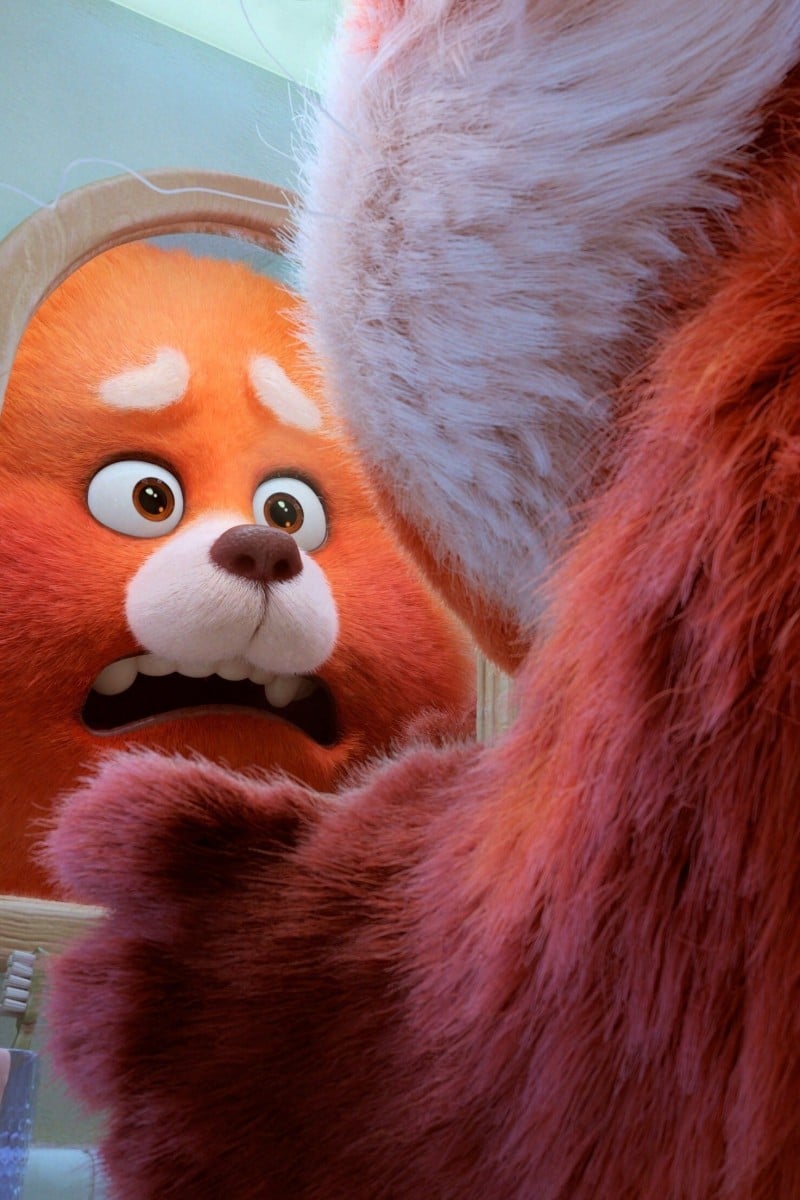
Puberty, periods and parent problems: How Turning Red tackles growing up with a cultural spin
- The animated film follows a teenage girl who poofs into a red panda – a metaphor for adolescence
- Director Domee Shi and co-writer Julia Cho wanted to embrace the ‘messiness’ of growing up and emotions that teenage girls are ‘taught at a young age to put away’
 ‘Turning Red’ highlights the complexities of puberty from the perspective of 13-year-old Meilin Lee (voiced by Rosaline Chiang). Photo: Disney+ via AP
‘Turning Red’ highlights the complexities of puberty from the perspective of 13-year-old Meilin Lee (voiced by Rosaline Chiang). Photo: Disney+ via APWhen we think of puberty, we typically imagine raging hormones and teenage angst. But Pixar’s latest movie is proving that isn’t something to demonise.
Turning Red (streaming on Disney+ Friday) offers a refreshing take on a traditionally uncomfortable topic by telling the story of Meilin “Mei” Lee (Rosalie Chiang), a 13-year-old Chinese Canadian honours student with adorably dorky confidence.
Like any awkward eighth grader, she enjoys hanging out with her friends and obsessing over boy bands, but often hides her true self to appease her protective, slightly overbearing mother Ming (Sandra Oh).
This all changes when Mei marks her womanhood by “poofing” into a giant, 8-foot red panda whenever she gets excited, angry, or overly emotional – a metaphor for adolescence.
“You kind of see the panda’s metaphor evolve along with Mei,” explains director Domee Shi, who helmed Pixar’s short film Bao in 2018. “It starts with puberty, but by the end, it’s clear the panda represents messiness: The messiness of growing up. The messiness of life. The messiness of all the emotions inside of us that we’re taught at a young age to put away because it causes a stir (and) grabs attention.”
For years, young girls have been taught “to be small, to control their emotions,” says Shi, who also co-wrote the screenplay. So instead of banishing the “beast,” she and co-writer Julia Cho wanted teens like Mei to embrace their “inner panda” in a society that often shames women for being too emotional.
Pixar’s Turning Red explores power of friendship, family and boy bands
“We’re living in this moment where it’s so much about authenticity and being our true selves, but it’s impossible if you do not actually embrace every part of yourself,” says Cho.
In Mei’s family, which frames her mom as strong-willed and her dad as steady and reserved, “there’s something so empowering and cool about how Mei is the first to embrace the messiness of herself. To be loud, to take up space and to be this unapologetic, large, goofy creature,” Shi adds.
Turning Red has already garnered praise from critics for its empowering and humorous take on a familiar coming-of-age story. As a mum, film critic Tessa Smith said the ending moved her to tears. “I related so hard to Turning Red. I get Mei, but I also get Ming,” she tweeted. Critic Kevin Lee said Mei “reminded me of myself and how difficult 13-year-old me must’ve been for my mum.”
The film is based on Shi’s own childhood experiences: Like Mei, she recalls frequently butting heads with her protective mother while navigating changes in her body and relationships – a common experience for many Asian immigrant kids torn between being dutiful kids and the chaos of adolescence.
Those behind Turning Red made sure to evoke that nostalgia and representation for Asian viewers while avoiding crude stereotypes.
For instance, the filmmakers initially hesitated on making Mei a straight-A student, out of concern that it could perpetuate Asians’ nerdy stereotype. But while reflecting on their own experiences and whether they were allowed to be B or C students growing up, Shi and Cho agreed to keep the narrative.
Tom Holland micast as lead in ‘Uncharted’ based on the video game
“We always approach the writing of these characters from their goals and motivations,” says Shi. “Mei really wants to be a good daughter to her mom and she truly loves her mom and family … but also she is being inexplicably drawn to this new world, to boys, her friends, to everything that the red panda represents.”
The same precautions were made to humanise Ming as more than just a stereotypical, emotionless “tiger mom.”
“What I tried to do was to make sure Ming was just as well balanced (as) Mei,” says Cho. “Ming is fully real and human as a mom, so you’re not only seeing her through Mei’s perspective but also having a larger perspective on who (Ming) is and why she is protective.”
Though the cute family-friendly film is all about the complexity of puberty, the beauty of Turning Red is that it hits home for viewers of all ages.
“Whether we’re 13, 33, or 53, we’re all constantly evolving to a version of ourselves that isn’t really our best version, but it’s our more true version,” Cho says. “It’s not about being the best you can be. It’s about being as much you as you can be.”